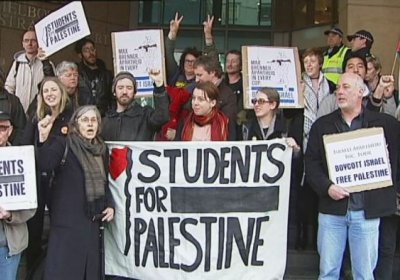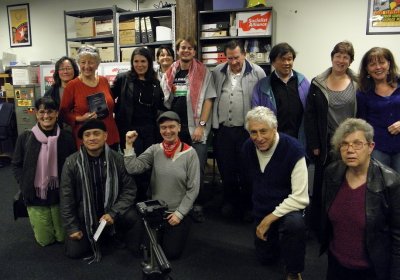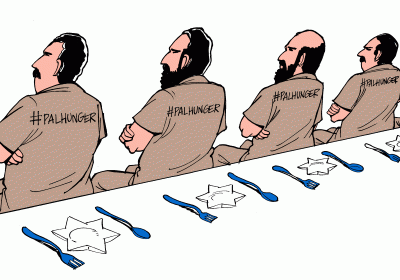Since the idea of Zionism (a Jewish state in historic Palestine) first gripped the minds of a few intellectuals, the state of Israel has represented its colonisation of the land of Palestine, and its uprooting of the Palestinian people, as a rejuvenation of the earth.
Israel
Activists in Melbourne have won a big victory for the right to political protest after the charges against the Max Brenner 16 were dismissed on July 23. The court trial lasted for 17 days in May.
The 16 Palestine solidarity activists had been arrested and charged over a protest outside the Max Brenner chocolate shop in QV Square, Melbourne in July last year. The protest was part of the campaign for boycott, divestment and sanctions (BDS) against Israel and the occupation of Palestine.
A poll released in May by the Israel Democracy Index has revealed most Israeli's hold deeply racist attitudes. The findings come in the wake of race riots and a crackdown on the rights of Palestinians.
The poll found 52% of respondents agreed with interior minister Eli Yishai that Africans were “a cancer on the body” of Israel, the June 7 Times of Israel said.
Yishai was quoted in the June 3 Maariv as saying most “Muslims that arrive here do not even believe that this country belongs to us, to the white man”.
Beyond Tribal Loyalties ― Personal Stories of Jewish Peace Activists
Edited by Avigail Abarbanel
Cambridge Scholars Publishing 2012.
Jews who come out on the side of Palestinians generally do not face terrible physical punishment, nor are they usually thrown in jail. But they often face ostracism, and this is what makes this community-creating book ― a collection of “Personal Stories of Jewish Peace Activists” ― so valuable.
A new report funded and supported by the British government accuses Israel of violating international law with its treatment of Palestinian child detainees, Electronic Intifada said on June 28.
It was was launched in London by a high-profile group of human rights lawyers on June 26.
Palestinians have achieved three consecutive victories in the past few months. In October last year, there was the release of hundreds of Palestinian prisoners in an exchange deal involving the kidnapped Israeli soldier Gilad Shalit.
Then there was a series of individual hunger strikes, which lasted unparalleled periods of time. These began with Khader Adnan, who went on hunger strike to protest against the Israeli policy of administrative detention (holding people in jail without charge, let alone a trial).
Manchester United legend Eric Cantona, FIFA President Sepp Blatter, UEFA President Michel Platini, renowned British film director Ken Loach and US intellectual Noam Chomsky are among international figures who have joined calls for Israel to release Palestinian footballer Mahmoud Sarsak.
25-year-old Sarsak is on hunger strike and close to death. A player with the Palestine national soccer team, he has been on hunger strike almost 90 days in protest at his imprisonment without charge or trial.
Thousands of Palestinian political prisoners held in Israeli prisons have called off a hunger strike after winning several key concessions from Israel.
Solidarity protests have been staged in the West Bank and Gaza Strip, occupied Jerusalem, and Israel, and tens of thousands joined a rally in the town of Kafr Kana in the Galilee. Actions in solidarity with the hunger strikers have been organised around the world.
Six Palestinians on hunger strike against their illegal long-term detention without trial in Israeli jails were close to death on May 8, the International Committee of the Red Cross said that day. Two of the six, Tha’er Halahleh, 33, and Bilal Diab, 27, had, by May 12, been on hunger strike for 75 days.
The other four prisoners had been on hunger strike for between 51 and 68 days on May 12.
Air France demanded to know the religion of a passenger on an April 15 flight from Nice to Tel Aviv and removed her because she was not Jewish.
The incident, confirmed by an Air France official, may violate international and European law by subjecting prospective passengers to illegal religious discrimination.
In recent days, Israeli authorities reacted to an effort by hundreds of European travellers to visit the occupied West Bank at the invitation of Palestinians by stationing hundreds of armed police and soldiers at the main international airport at Lydd.
Literature Nobel laureate and Germany's most famous living author Gunter Grass labelled Israel a threat to "already fragile world peace" in his poem “Was gesagt werden muss” (“What must be said”).
The work, published by German daily Sueddeutsche Zeitung on April 4, accuses "the West" of hypocrisy in relation to the arming of Israel. In publishing the poem, Grass, who regards himself as "irrevocably connected to the country of Israel” has made a big contribution to breaking a long standing German taboo about publicly criticising Israel's warmongering.
- Previous page
- Page 27
- Next page










